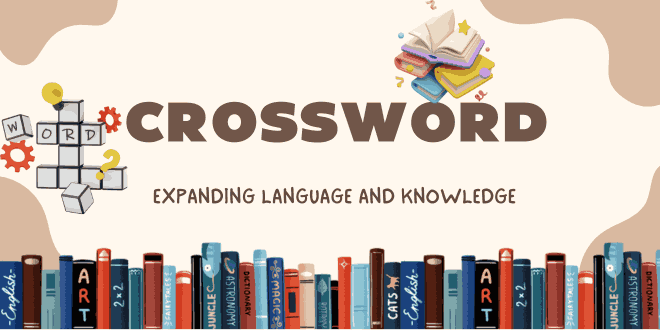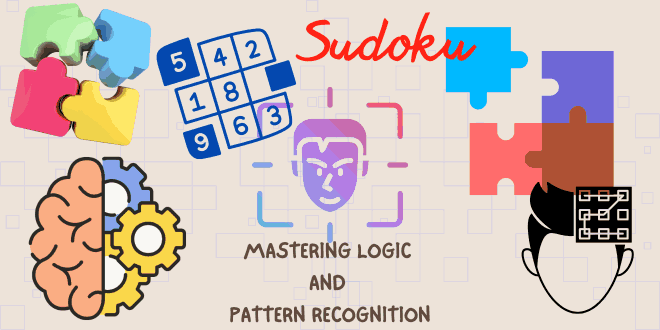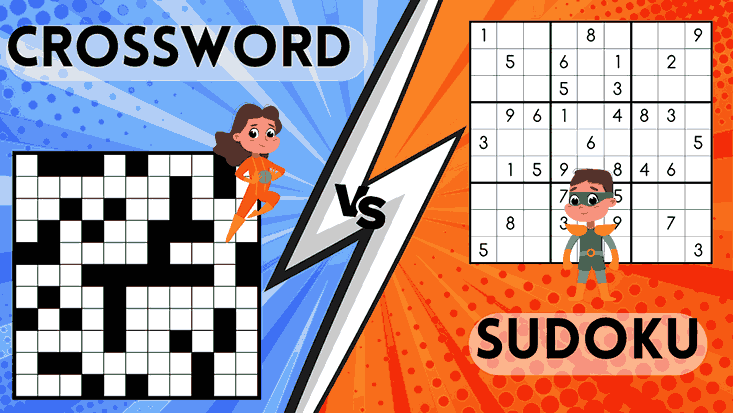Table of Contents
- Introduction
- The Battle of the Puzzles: Crossword vs. Sudoku
- A Brief Overview of Crossword Puzzles
- A Brief Overview of Sudoku Puzzles
- What Skills Do These Puzzles Sharpen?
- Crossword: Expanding Language and Knowledge
- Sudoku: Mastering Logic and Pattern Recognition
- Difficulty Levels: Which One is More Challenging?
- Crossword: Difficulty Depends on Word Knowledge
- Sudoku: A Purely Logical Challenge
- Relaxation or Brain Workout? What’s Your Goal?
- Crossword: A Leisurely Escape
- Sudoku: A Meditative Focus
- Which Puzzle Suits Your Lifestyle?
- Best for Commuters or Busy Schedules?
- Best for Social Interaction?
- Conclusion: Which One Should You Choose?
- FAQs
1. Introduction
Are you someone who enjoys unraveling clever wordplay, or do you prefer diving into a world of numbers and logic? Crossword and Sudoku are two of the most popular puzzle games, each offering a different mental workout. But which one is right for you? Let’s explore their differences and see which puzzle best matches your interests and strengths.
2. The Battle of the Puzzles: Crossword vs. Sudoku
A Brief Overview of Crossword Puzzles
Crossword puzzles challenge players to fill a grid with words based on given clues. These clues range from straightforward definitions to tricky wordplay, requiring a mix of vocabulary, general knowledge, and deductive reasoning. Whether you’re a trivia buff or a lover of clever word tricks, crosswords keep your brain engaged in a unique way.
A Brief Overview of Sudoku Puzzles
Sudoku, on the other hand, is a number-placement puzzle that relies purely on logic. The classic version consists of a 9×9 grid, where players must place digits 1 to 9 in such a way that no number repeats in any row, column, or 3×3 sub-grid. Unlike crosswords, Sudoku doesn’t require prior knowledge—just patience, pattern recognition, and strategic thinking.
3. What Skills Do These Puzzles Sharpen?
Crossword: Expanding Language and Knowledge
If you love words, crosswords will feel like a playground for your mind. They sharpen vocabulary, improve spelling, and expand general knowledge. Many crossword puzzles incorporate history, science, pop culture, and even puns, making them an educational and entertaining challenge. Plus, they encourage lateral thinking—sometimes the answer is hidden in plain sight, but you have to think outside the box to find it.

Sudoku: Mastering Logic and Pattern Recognition
Sudoku is all about logical reasoning. It strengthens problem-solving skills and enhances concentration by forcing players to think multiple steps ahead. Each number placement influences the rest of the grid, so players must analyze patterns and make strategic decisions. If you enjoy structured thinking and methodical problem-solving, Sudoku might be your perfect match.

4. Difficulty Levels: Which One is More Challenging?
Crossword: Difficulty Depends on Word Knowledge
Crosswords vary widely in difficulty. Easy puzzles use common words and simple clues, while harder ones demand extensive vocabulary and cultural knowledge. Some crossword clues involve puns or wordplay, making them trickier even for seasoned solvers.
Sudoku: A Purely Logical Challenge
Sudoku’s difficulty isn’t about what you know—it’s about how you think. While beginner puzzles have more clues to guide you, advanced ones require deeper analysis and multi-step logic. Unlike crosswords, where experience with words helps, Sudoku presents an equal challenge to everyone, regardless of background.
5. Relaxation or Brain Workout? What’s Your Goal?
Crossword: A Leisurely Escape
Crosswords can be a relaxing way to unwind, especially when you’re solving them at your own pace with a cup of coffee in hand. Many people enjoy solving them in groups, turning it into a social experience that sparks discussions and laughter.
Sudoku: A Meditative Focus
Sudoku offers a different kind of relaxation—one rooted in quiet concentration. Its logic-based nature makes it almost meditative, helping players zone out distractions and focus on the puzzle at hand. If you enjoy solo challenges that require deep thinking, Sudoku provides a satisfying mental escape.
6. Which Puzzle Suits Your Lifestyle?
Best for Commuters or Busy Schedules?
Sudoku is perfect for quick bursts of problem-solving, making it ideal for short breaks or commutes. You can pause mid-puzzle and resume anytime without losing context.
Best for Social Interaction?
Crosswords are great for teamwork. Whether you’re solving with a friend or competing to see who finishes first, they encourage conversation and collaboration. If you enjoy sharing your puzzle-solving experience, crosswords have the edge here.
7. Conclusion: Which One Should You Choose?
At the end of the day, both Crossword and Sudoku offer fantastic mental exercises—just in different ways. Studies suggest that people who regularly play Sudoku and Crossword puzzles have sharper brains. Read more about the study. If you thrive on words, knowledge, and creative thinking, crosswords are your go-to. If you prefer logic-driven, numbers-based challenges, Sudoku is your best bet. So, grab a Sudoku puzzle of your choice. Or why not enjoy both? A balanced puzzle diet might be the key to keeping your brain in top shape!
8. FAQs
1. Which puzzle is better for brain health?
Both! Crosswords improve verbal skills and memory, while Sudoku strengthens logical thinking and problem-solving abilities.
2. Is Sudoku harder than Crossword?
It depends. Sudoku difficulty is based on logical complexity, while crosswords rely on word knowledge. If you struggle with vocabulary, crosswords might seem harder. If you’re not a fan of numbers, Sudoku could feel trickier.
3. Can solving these puzzles daily improve cognitive function?
Yes! Studies suggest that engaging in puzzles regularly can help enhance memory, attention, and cognitive flexibility, potentially reducing the risk of cognitive decline.
4. Which puzzle is better for beginners?
For word lovers, easy crosswords are a great start. For those who enjoy numbers and patterns, beginner-level Sudoku puzzles provide a gentle introduction without the need for prior knowledge.
